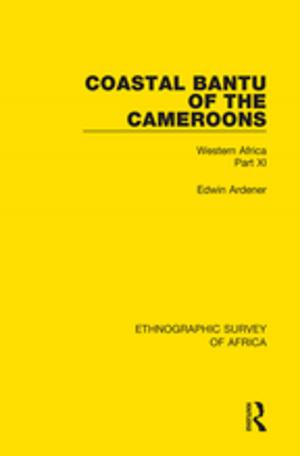| Author: | Victor W. Turner | ISBN: | 9781351499026 |
| Publisher: | Taylor and Francis | Publication: | July 12, 2017 |
| Imprint: | Routledge | Language: | English |
| Author: | Victor W. Turner |
| ISBN: | 9781351499026 |
| Publisher: | Taylor and Francis |
| Publication: | July 12, 2017 |
| Imprint: | Routledge |
| Language: | English |
Politics: a static network of structural and functional models? Is it a "given" set of rules, statuses and procedures? Or a dynamic process, a continuum related to the past as well as to the present and continually influenced by pressures within and outside of a society? Taking the latter view of the nature of political behavior, the editors of Political Anthropology here present an original compilation of papers that thoroughly assess contemporary anthropological research and theory on political phenomena and explore the sources and maintenance of political power. One of the aims of this book is to take tentative steps toward resolving the developing crisis by investigating the structure of political action revealed in empirical data. Within the general framework of political dynamics the book uses processes such as decision making, the judicial process, the disturbance and settlement of policy issues, the application of sanctions, and the outcome of disputes among other things. These items will find their places as components of phases in the major sequence. Investigating societies from Africa to Alaska, politics is shown to be a global phenomenon--a "human process of action" centering on the conflict between the "common good" and "interests of groups," and on the resolution or extension of that conflict by the religious, structural, sociocultural, and psychological pressures within and external to a social grouping. Essential reading for anyone concerned with the nature of political process, Political Anthropology presents a fresh, important and comprehensive overview of the "wind of change" currently abroad in the study of political behavior.
Politics: a static network of structural and functional models? Is it a "given" set of rules, statuses and procedures? Or a dynamic process, a continuum related to the past as well as to the present and continually influenced by pressures within and outside of a society? Taking the latter view of the nature of political behavior, the editors of Political Anthropology here present an original compilation of papers that thoroughly assess contemporary anthropological research and theory on political phenomena and explore the sources and maintenance of political power. One of the aims of this book is to take tentative steps toward resolving the developing crisis by investigating the structure of political action revealed in empirical data. Within the general framework of political dynamics the book uses processes such as decision making, the judicial process, the disturbance and settlement of policy issues, the application of sanctions, and the outcome of disputes among other things. These items will find their places as components of phases in the major sequence. Investigating societies from Africa to Alaska, politics is shown to be a global phenomenon--a "human process of action" centering on the conflict between the "common good" and "interests of groups," and on the resolution or extension of that conflict by the religious, structural, sociocultural, and psychological pressures within and external to a social grouping. Essential reading for anyone concerned with the nature of political process, Political Anthropology presents a fresh, important and comprehensive overview of the "wind of change" currently abroad in the study of political behavior.















